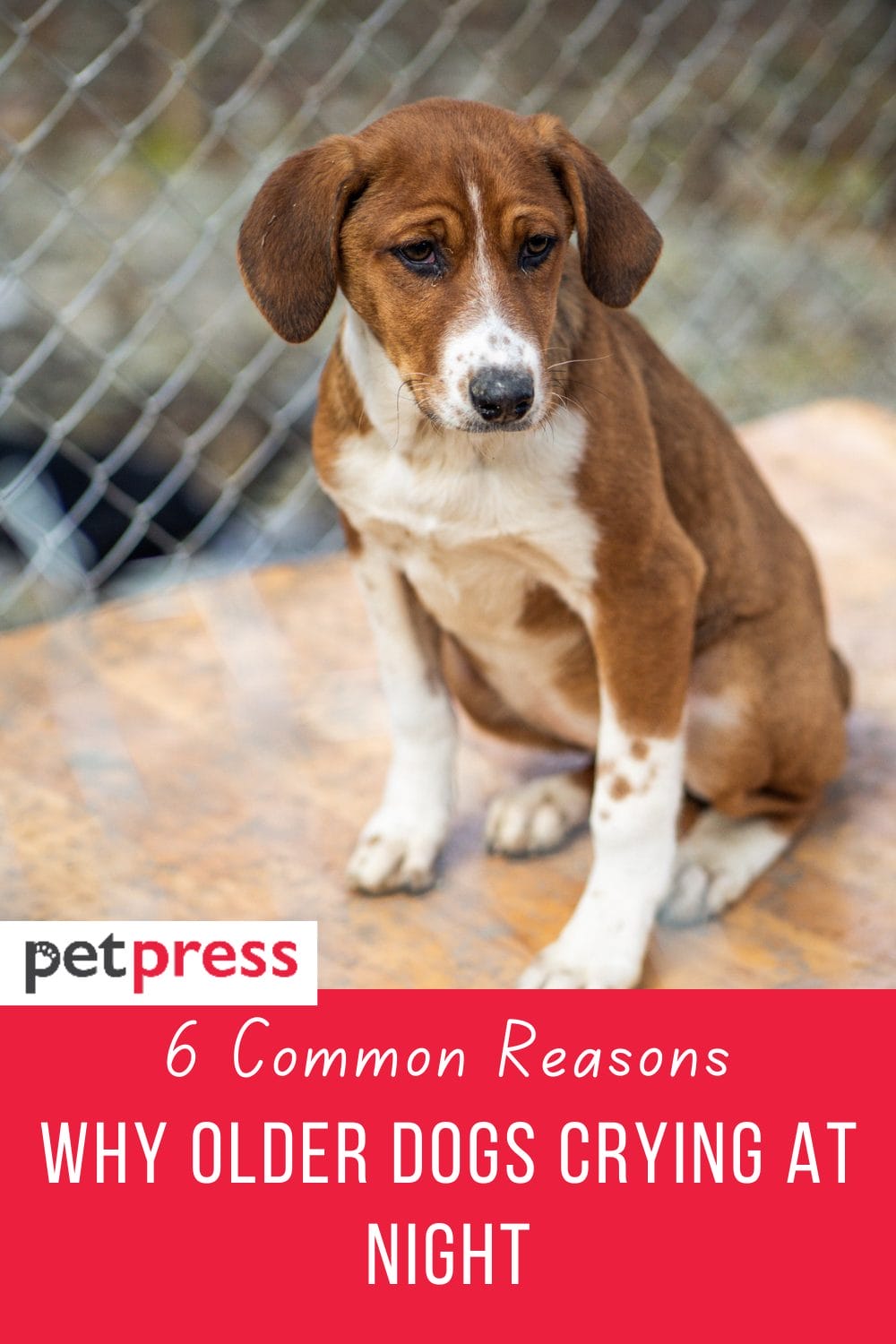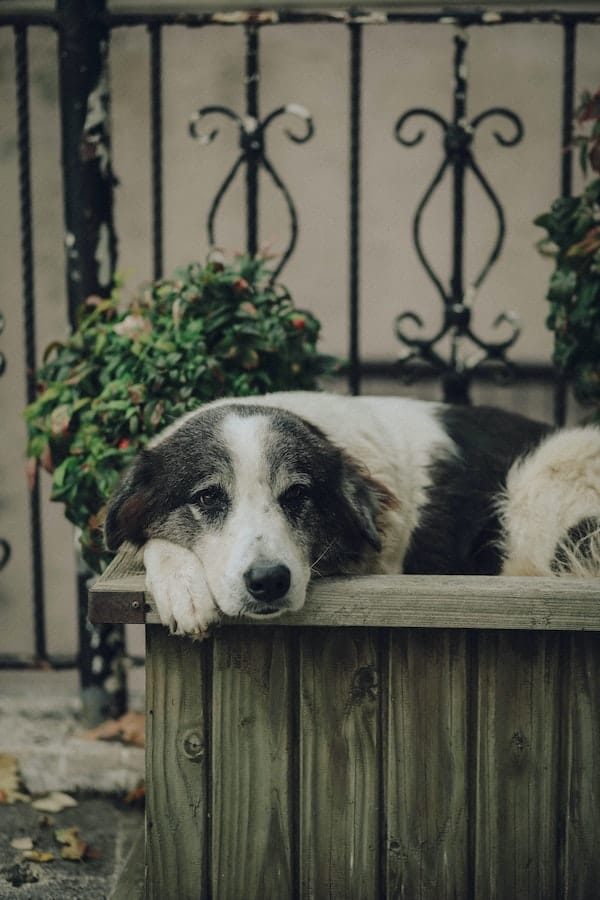
Hey there, all you pet parents!
Is your elderly fur baby giving you sleepless nights with their tears?
We all go through changes as we grow older, and our pups are no different.
If your golden-aged pooch has started crying at night, it could leave you scratching your head.
So, what’s causing this switch in their behavior?
More importantly, how can you lend a helping paw?
Let’s jump right in and find out, okay?
Why Do Older Dogs Cry at Night?
A peaceful night can quickly turn worrisome when your older dog begins to cry. What might be the reasons?
Cognitive dysfunction syndrome
Just like humans can develop dementia, dogs can experience a similar condition known as Canine Cognitive Dysfunction Syndrome.
This syndrome often surfaces in older dogs and can bring about a range of perplexing symptoms.
Imagine your loyal four-legged friend suddenly becoming disoriented, forgetful, or confused.
It’s almost as if they are trapped in a maze of their own mind.
This confusion can be particularly distressing at night, leading to increased anxiety, which may manifest as restless pacing, whimpering, or even outright crying.
Pain or discomfort
As dogs age, their bodies often start to show signs of wear and tear.
Conditions like arthritis can cause a considerable amount of discomfort.
Just think about how you might feel if your joints ache with every step.
For our canine friends, this discomfort can make it challenging to settle comfortably at night.
They may try to find a position that doesn’t exacerbate their pain, which can lead to restlessness and vocalization.
The night becomes a battle of finding a pain-free spot, and this struggle can indeed cause distress and crying, as they can’t communicate their pain in words but rather through their actions and vocalizations.

Changes in vision or hearing
Aging frequently comes hand in hand with a decline in vision or hearing.
Picture yourself in a world where the once-familiar surroundings turn into vague, shadowy forms, and the comforting sounds of your home become distant echoes.
It’s no wonder that for dogs, this can be a perplexing and unsettling experience.
The darkness and quiet of the night can transform into a world of uncertainty.
The fear of not being able to see or hear what’s around them can lead to anxiety and restlessness.
Increased anxiety
As dogs get older, they can become more vulnerable to anxiety.
The world they’ve known and trusted for years may start to feel unfamiliar and unpredictable.
Imagine being in their paws, where simple changes in routine or surroundings can trigger feelings of unease.
Nighttime, with its shadows and silence, can accentuate these feelings, leading to restlessness and vocal expressions of anxiety, such as whining or crying.
It’s as if they’re reaching out to us, seeking reassurance in the midst of their uncertainties.
Boredom and loneliness
Just like humans, dogs can experience boredom and loneliness, which can be particularly challenging for senior dogs.
While they might not have the same boundless energy as when they were younger, their need for mental stimulation and companionship remains.
If your dog is getting enough exercise and interaction during the day but still cries at night, it’s possible they’re feeling bored or lonely.
Providing them with a calming toy or playing soothing music in the background during the night can offer comfort and mental engagement.
Need to go to the bathroom
Sometimes, the reason behind a dog’s nighttime crying is straightforward – they may need to answer the call of nature.
Just like us, older dogs might have more urgent bathroom requirements, and their discomfort will manifest as vocalization.
To help alleviate this, ensure you take your dog for a walk before bedtime and make sure they have easy access to water throughout the night.
It’s akin to providing them with the opportunity for a peaceful night’s rest, uninterrupted by the pressing need to relieve themselves.

How Can You Help Your Older Dog Stop Crying at Night?
Helping your older dog stop crying at night involves creating a nurturing environment that caters to their specific needs and anxieties.
Let’s delve deeper into these strategies:
Establish a bedtime routine
Just like with children, dogs thrive on routine.
It provides them with a sense of security and predictability, which can be particularly soothing for older dogs.
Start by setting a consistent bedtime and dinner schedule.
Ensure they get regular exercise during the day, but be mindful not to engage in vigorous activity too close to bedtime.
This routine can help them wind down and prepare for a peaceful night’s rest, as their bodies and minds come to expect the soothing rhythm of the day’s end.
Provide comfort
As our furry friends age, they might experience discomfort, especially if they suffer from conditions like arthritis.
You can make their sleeping space more comfortable by adding extra padding to their bed.
Think of it as offering them a plush, cozy sanctuary where they can relax and sleep soundly.
Also, if your dog’s vision is deteriorating, leaving on a nightlight can be immensely comforting.
Just like we might be uneasy in complete darkness, they can find solace in the gentle glow of a nightlight, making the nighttime environment less intimidating.
Night lights
Night lights are not just for children.
They can be a game-changer for older dogs as well.
Imagine navigating a dark room with compromised vision; it can be genuinely perplexing and anxiety-inducing.
Providing night lights around their sleeping area and along the path to the bathroom can help your dog move with confidence, reducing their anxiety and restlessness at night.
It’s akin to creating a well-lit, familiar night-time terrain that eases their worries.
Calming techniques
Sometimes, all it takes to ease your dog’s restlessness is a little extra TLC.
Picture this: you gently pet your dog, stroke their fur, and whisper soothing words to reassure them.
It’s like offering a warm embrace in the language they understand.
Playing calming music can also have a remarkable impact.
Just as we find solace in soothing melodies, your dog can be comforted by the gentle tunes.
These calming techniques can work wonders, turning a night of anxiety and restlessness into one of serenity.

A consistent routine
Dogs are creatures of habit, and this holds true for senior dogs as well.
Maintaining a consistent routine can provide them with a sense of security.
Think of it as the reassuring cadence of everyday life.
Set regular feeding times and bathroom breaks.
It’s like giving your dog a reliable schedule that they can count on. This predictability can ease their anxiety and help them navigate the night with a sense of certainty.
Training and behavior modification
Sometimes, the challenges your senior dog faces may require professional guidance.
Enlisting the help of a dog trainer or behaviorist can be immensely beneficial.
They have the expertise to address anxiety or behavioral issues. Imagine having a seasoned guide to navigate the complexities of your dog’s emotional world.
They can develop a tailored plan to help your senior pup find peace during the night.
Consult a vet
If your dog’s nighttime crying persists despite your best efforts, it’s essential to consider a visit to the vet.
Just as you’d consult a doctor for your own health concerns, your furry companion deserves the same care.
A vet can provide a proper diagnosis, ruling out underlying medical conditions or discomfort that may be contributing to their restlessness.
They can also create a tailored treatment plan, which may involve medication or other interventions to manage pain, anxiety, or other health issues.
Wrapping Up
Navigating through the issue of your senior dog crying at night can be a tough ride, tugging at your heartstrings and testing your patience.
But always remember, our furry pals aren’t doing this to get on our nerves – they’re simply trying to tell us something’s wrong.
With a sprinkle of detective work, a whole lot of patience, and some professional help from your vet, we can certainly find a way to reclaim those peaceful, quiet nights for both you and your much-loved pet.
FAQs
Sudden changes in behavior are usually a sign that something’s amiss. It could be down to health issues like arthritis, dementia, or even increased anxiety.
While it’s not uncommon for older dogs to cry at night due to aging-related issues, it is not a typical or healthy behavior. It’s a sign that something needs addressing.
If the crying persists for several nights, even after attempting to alleviate the issues, or if the crying is accompanied by other worrying symptoms, a vet visit is in order.
While it might be tempting, ignoring your dog’s crying isn’t the best solution. Their cries are their way of communicating discomfort or distress, and it’s important to identify and address the root cause.
- Does Cat Litter Melt Ice? The Complete Guide to Winter Safety - January 30, 2026
- Happy Tail Dogs: Understanding This Common Canine Condition - January 29, 2026
- How Cold Can Outdoor Cats Handle? Feline Winter Safety - January 27, 2026


GIPHY App Key not set. Please check settings